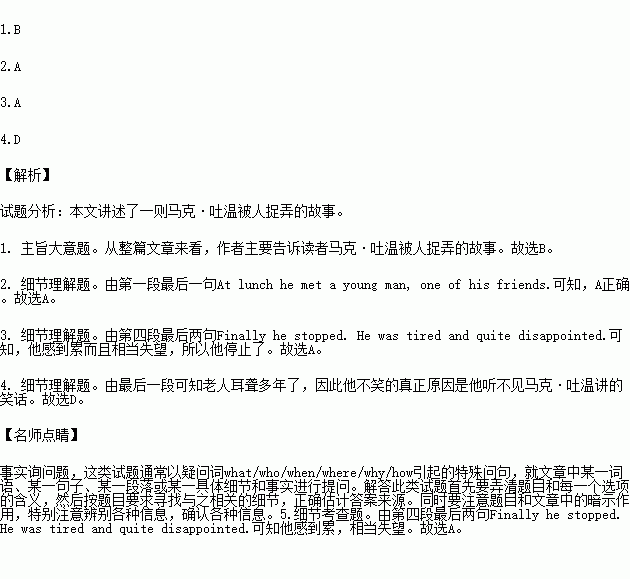题目内容
Mark Twain, the famous American writer and a great master of humor, liked to play jokes on others. But once a joke was played on him. One day Mark Twain was invited to give a talk in a small town. At lunch he met a young man, one of his friends.
The young man said that he had an uncle with him. He told Mark Twain that his uncle never laughed or smiled, and that nobody and nothing was able to make his uncle smile or laugh.
"You bring your uncle to my talk this evening," said Mark Twain. "I'm sure I can make him laugh."
That evening the young man and his uncle sat in the front. Mark Twain began to speak. He told several funny stories and made everyone in the room laugh. But the man never even smiled. Mark Twain told more funny stories, but the old man still kept quiet. Mark Twain continued to tell his funny stories. Finally he stopped. He was tired and quite disappointed.
Some days later, Mark Twain told another friend what had happened." Oh," said his friend, "I know that man. He's been deaf for years."
1.The writer wrote the passage mainly to ________.
A. tell readers Mark Twain liked playing jokes
B. tell readers a joke played on Mark Twain
C. tell readers Mark Twain was a great writer
D. tell readers how to tell a funny story
2.One day Mark Twain met ________ at lunch.
A. a friendB. his brotherC. his teacherD. a young girl
3.Mark Twain stopped finally because he was ________.
A. disappointedB. sorryC. illD. sleepy
4.Mark Twain couldn't make the old man laugh because ________.
A. his jokes were not funny
B. the old man wasn't interested in the jokes
C. the old man could tell more funny jokes
D. the old man was deaf
 阅读快车系列答案
阅读快车系列答案请认真阅读下列短文,并根据所读内容在文章后表格中的空格里填入一个最恰当的单词。请将答案写在答题卡上相应题号的横线上。每个空格只填1个单词。
Some students get so nervous before a test, they do poorly even if they know the material. Sian Beilock has studied these highly anxious test-takers.
Sian Beilock: “They start worrying about the consequences. They might even start worrying about whether this exam is going to prevent them from getting into the college they want. And when we worry, it actually uses up attention and memory resources. I talk about it as your cognitive horsepower that you could otherwise be using to focus on the exam.”
Professor Beilock and another researcher, Gerardo Ramirez, have developed a possible solution. Just before an exam, highly anxious test-takers spend ten minutes writing about their worries about the test.
Sain Beilock: “What we think happens is when students put it down on paper, they think about the worst that could happen and they reappraise the situation. They might realize it’s not as bad as they might think it was before and, in truth, it prevents these thoughts from appearing suddenly when they’re actually taking a test.”
The researchers tested the idea on a group of twenty anxious college students. They gave them two short math tests. After the first one, they asked the students to either sit quietly or write about their feelings about the upcoming second test.
The researchers added to the pressure. They told the students that those who did well on the second test would get money. They also told them that their performance would affect other students as part of a team effort.
Professor Beilock says those who sat quietly scored an average of twelve percent worse on the second test. But the students who had written about their fears improved their performance by an average of five percent.
Next, the researchers used younger students in a biology class. They told them before final exams either to write about their feelings or to think about things unrelated to the test.
Professor Beilock says highly anxious students who did the writing got an average grade of B+, compared to a B- for those who did not.
Sain Beilock: “What we showed is that for students who are highly test-anxious, who’d done our writing intervention, all of a sudden there was no relationship between test anxiety and performance. Those students most prone to worry were performing just as well as their classmates who don’t normally get nervous in these testing situations.”
But what if students do not have a chance to write about their fears immediately before an exam or presentation? Professor Beilock says students can try it themselves at home or in the library and still improve their performance.
Title: Overcoming test 1.______________ | |
Problem | Some students get nervous before a test, so they can’t do 2. __________ even if they know the material. |
Reason | 3.__________ about the consequences 4._________ them their attention and memory resources. |
Solution | Write down their worries to 5.________ the negative thoughts appearing suddenly. |
Results of the researches | College students: 6._______ with those sitting quietly, students writing about their fears improved their performance. |
Younger students: highly anxious students who did the writing instead of 7._______ things unrelated to the test got 8. _______ grades. | |
9.___________ ways to solve the problem | If students have no 10.________ to write about their fears immediately, they can try it themselves at home or in the library. |

